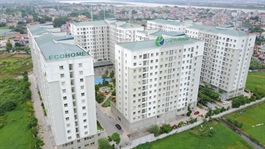Industrial real estate attracts foreign investors via M&A
Industrial real estate attracts foreign investors via M&A
Industrial real estate remains the hottest segment in the mergers and acquisitions (M&A) market, accounting for 35 per cent of the total transaction value with numerous outstanding deals. VIR’s Oanh Nguyen sat down with Do Gia Long, deputy general director of Redsunland Investment JSC – one of the leading consultant companies in the industrial real estate sector – to talk about the advantages of this method, the barriers to it, and solutions to foster deals.
Acquiring a well-established local entity is a preferable market-entry strategy for many foreign companies, particularly in the industrial real estate market. What are domestic enterprises’ advantages in attracting foreign industrial real estate developers?
In the M&A playground, foreign investors often have an advantage in terms of capital and experience. Meanwhile, the biggest strength of the local side is its insight, which is shown in its overall understanding of policies, the planning of industrial parks (IP), transport infrastructure, and even urban planning around IPs. In addition, they understand the characteristics of each region and the demographic, which will help businesses recruit employees more easily.
To establish an IP, it needs the approval of the prime minister and dozens of signatures from various authorities, thus having an insight into policies and flexibility will create favourable conditions for investors throughout the process from completing the procedures to building and operating the IP.
Selecting the M&A method will help foreign investors reduce part of the burden of the administrative procedures, which is one of their greatest concerns.
To my knowledge, foreign industrial real estate developers do not directly apply for permits to develop IPs. They just rent land that is planned for the development of IPs, build facilities, and invite manufacturers.
What problems can foreign investors face during the process of negotiating M&A deals for industrial property?
Enterprises implement M&A transactions in three common ways, namely asset purchase, the acquisition of shares or capital contributions from target companies, or through a merger or consolidation. Each transaction type has pros and cons for investors, depending on the case.
During asset purchases, the process of buying each asset will take time with complex documents required for each asset type.
For example, an Australian business – that is a customer of Redsunland – wants to buy a factory from a domestic partner for $6.5 million. The problem is that the domestic partner is a business with a 5 per cent state-owned stake, and it is extremely complicated to transfer the asset to the foreign side it may have to return a part of the asset to the state in the future.
Thus the Australian company could not accept this regulation and then gave up on the deal. The investors are also advised to prepare for a very high tax rate – as much as 20 per cent – for the purchase of the property.
Another example is a customer who has the intention to buy an IP in the northern province of Hai Duong. The two parties reached a compromise on the contract and the IP does not have any legal issues. The only problem is that the director of the IP’s investor was in prison, thus the foreign investor could not complete the procedures to hand over the IP.
Business valuation and transparency are the two most important factors determining the success of M&A deals.
The investors may face also conflicts of culture between the merging companies. During operation, parties face difficulties balancing the interests of all stakeholders (shareholders, employees, and management team), which is crucial to ensure the smooth operation of the merged company.
Furthermore, some parties cannot reach a compromise on the term of the cooperation. Foreign investors are often interested in cooperating with partners to develop an IP when the land clearance work is completed, while domestic enterprises want their partners to be involved from the start.
What are the most important factors that determine the success of M&A deals?
Business valuation and transparency are the two most important factors determining the success of M&A deals. According to Redsunland’s experience, the most regular issue is that domestic sides often offer a much higher valuation for the deal compared to their businesses’ real value. Thus, the deals fail because the parties can not reach a compromise on the deal price.
In addition, when foreign investors decide to acquire shares and capital contributions from partners, the buyer automatically inherits all financial liabilities and might face unforeseen disputes or compliance issues down the line. Thus, transparency is one of the leading criteria when foreign investors look for partners.
As a result, it is important to have intermediary agencies in charge of the due diligence that can foresee the potential risks of the target company and ensure transparency. These intermediaries do not work as brokerage agencies (which connect the buyers and sellers), they are in charge of consultant firms that can value the business accurately so the parties can reach a deal more easily.
For example, Redsunland’s customers often estimate their business at double their real value. Our consultant team’s work is to assess the sellers’ assets in detail, along with the total investment in the facilities and machinery infrastructure.
In cases where investors want to buy an IP or cluster, we also have to value the fees for land clearance and compensation, among others. This work helps sellers to understand their business’s real value. In many cases, after having Redsunland’s valuation, the business value reduces by half compared to their initial expectation.
The lack of transparency when providing information from domestic enterprises is one of the most serious concerns for foreign investors. To avoid this situation, we have to study legal dossiers carefully and identify any unresolved problems relating to the tax, other debts, or property disputes.
Our company often fully resolves the above problems before setting up meetings for buyers and sellers, so the success rate is much higher.
What are the legal proposals to foster M&A deals in terms of industrial real estate?
The current legal regulation for this method is quite complete, the important factor in creating smooth deals is law enforcement.
The government should issue policies with detailed guides to encourage new IP models that can catch up with the latest investment trends. Decree No.35, which replaces Decree No.82 from 2018, offers some notable changes in the management of IPs and economic zones. For example, the new decree specifies conditions for the conversion of industrial parks into urban-service areas.
Besides this, Decree 35 classifies the types of industrial zones, including supporting industrial zones, specialised industrial zones, high-tech industrial zones, industrial parks, and urban-service developments. These adjustments will contribute to attracting more industrial real estate developers.
























